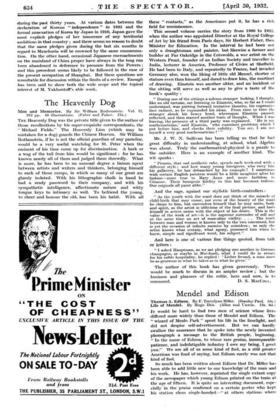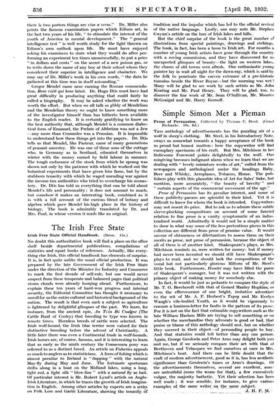Mendel and Edison
IT would be hard to find two men of science whose lives differed more widely than those of Mendel and Edison, The " wizard of Menlo Park " spent his life in the limelight, and did not despise self-advertisement. But we can hardly swallow the assurance that he spoke into the newly invented phonograph a message . to the British people, beginning, " In the name of Edison, to whose rare genius, incomparable patience, and indefatigable industry I owe my being, I. greet you." We are all of us some kind of fool, as a still greater American was fond of saying, but Edison surely was not that kind of fool.
So much has been written about Edison that Dr. Miller has been able to add little new to our knowledge-of the man and his work. He has, however, reprinted the single extant copy of the newspaper which young Edison printed on the train at the age of fifteen. It is quite an interesting document, espe- cially in the praise conferred on a certain porter who kept his station clean single-handed—" at others stations where there is two porters things are visa a versa." Dr. Miller also prints the famous examination papers which Edison set, in the last two years of his life, " to stimulate the interest of the youth of America in mental development." The " general intelligence test " is well worth.study for the light thrown on Edison's own outlook upon life. He must have enjoyed asking his examinees to state what they would do after per- forming an experiment ten times unsuccessfully, to put a price " in dollars and cents " on the secret of a new poison gas, or to write down the name of any boy at their school whom they considered their superior in intelligence and character. We may say of Dr. Miller's work in his own words, the data he gathered at this time was in itself astounding."
Gregor Mendel came near earning the Roman commenda- tion, Bene aril qui bene latuit. Dr. Hugo Iltis must have had great difficulty in producing anything that could fairly be called a biography. It may be asked whether the work was worth the effort. But when we all talk so glibly of Mendelism and the Mendelian theory we ought to know something more of the investigator himself than has hitherto been available to the English reader. It is certainly gratifying to know on the best authority that, although Mendel is a common dialec- tical form of Emanuel, the Prelate of Mtbriinn was not a Jew —any more than Crummles was a Prussian. It is impossible to understand how these things get into the papers. Dr. Iltis tells us that Mendel, like Pasteur, came of many generations of peasant ancestry. He was one of those sons of the cottage who, in Germany as in Scotland, educated themselves in winter with the money earned by field labour in summer. The tough endurance of the stock from which he sprang was shown not only by the patience with which he worked out the botanical experiments that have given him fame, but by the stubborn tenacity with which he waged unending war against the income-tax authorities who tried to overcharge his monas- tery. Dr. Iltis has told us everything that can be told about Mendel's life and personality; it does not amount to much, but somehow it makes an interesting book, combined as it is with a full account of the curious blend of botany and algebra which gave Mendel his high place in the history of biology. The book is admirably translated by Dr. and Mrs. Paul, in whose version it reads like an original.







































 Previous page
Previous page